#Sozin’s comet part 1
Explore tagged Tumblr posts
Text
Sozin’s Comet Part 1 Re-Watch
This is a great start to the finale & a strong set up for Aang vs. Ozai. The beach party at the start provided a lot of great comedy - especially Sokka’s “sculpture” of Suki. Oh, & on the topic of comedy, shout out to Melon Lord Toph, she always cracks me up.
I’ve already said I think the overarching season could’ve done a stronger job building Ozai as the big bad but in terms of the final episodes the tension is built well. Zuko attacking Aang to “teach him a lesson” - yeah that seems about right. Very Zuko behavior. We love a dramatic bitch. I loved the Gaang coming together & agreeing to do this together. This group of found family means the world to me.

For real though, the reveal about what was said during that war meeting is pretty chilling. Also, the way both Zuko & Azula were determined to get Ozai’s approval during that meeting was a super interesting glimpse at the dynamic between the three of them. I think that - in Azula’s mind - they were finally a happy family. Azula just builds off what Zuko is saying - she has no idea that he had a different perspective on the earth kingdom’s “hope” than her & Ozai, (how could she?) - she’s just building off Zuko’s points in a way that makes sense & would be expected of her. It’s sick & twisted, but Ozai is pleased. What I’m getting at is that this flashback shows what would seem like a war meeting gone well from Azula’s perspective. Zuko’s betrayal shortly after was clearly the first in a series of events that shocked Azula to her core.
Aang gets a lot of crap from the fandom for freaking out at the idea of killing Ozai. I do think though that while the others are 100% justified in advocating for Ozai’s death & I understand them & agree with them - I feel bad for Aang too. His culture was eradicated by the Fire Nation - his culture that is all about peace & forgiveness. The baby picture of Ozai is a nice touch to show that even 0zai is a human being, & taking his life would matter & should not be taken lightly.
Some people may not want to hear this but I think that if Aang had ended up killing Ozai, it would not be as satisfying as you think. It would have meant Aang going against his own culture, of which he is the last surviving member - & I just don’t think that ending would be as nice as it might seem on the surface. The first time I watched the show, I did really want Aang to kill Ozai but I’ve thought about it a lot more since then & I really do not think that ending would have been good at all.

I also like that they first thought it was a baby picture of Zuko because while it’s “haha funny” it’s also significant. No one is born evil. Not Ozai, & not Zuko. And the person Ozai is now? That’s 100% what Zuko could have become if he had not made the right choice & decided to fight for peace & balance & to confront his violent past & work to be better.
The ending with Ozai telling Azula that he’s leaving her behind is heartbreaking. How anyone can watch her complete childlike hurt - the desperation to please her father - & not feel empathy for her is just… beyond me. Azula learning that she’s getting left behind breaks my heart every time.
This episode was a great start to the final arc! That’s all I have for now.
#yeah no one earned any iconic behavior points in this episode#I thought about giving them to Zuko for his dramatic bitch behavior attacking Aang#but he’s probably already super ahead of everyone so eh#Sozin’s comet part 1#atla book 3#atla re watch
27 notes
·
View notes
Text

purest ship
11 notes
·
View notes
Text
The Lightning Scene, How Azula Targeted Katara (of All People), and the Doylist Reason Why That Matters
Mention Zuko's sacrifice for Katara in Sozin's Comet Part 3 as part of a pro-Zutara talking point, and invariably you'll get a Pavlovian response of:
"But Zuko would have taken the lightning for anyone."
(Not to be confused with the similar-sounding Pavlovan response, which is "Zuko's sacrifice ain't shit compared to a mouth-watering, strawberry-topped meringue dessert"*, which is actually the only valid counter-argument to how the lightning scene is a bona fide Zutara treasure, but I digress.)
Now, I've talked in depth about how the lightning scene is framed far more romantically than it had any right to be, regardless of how you might interpret the subject on paper; this is an argument which I still stand by 100%. That Zuko would have gotten barbecued for anyone, and that he was at the stage of his arc where his royal kebab-ness represented his final act of redemption, doesn't change the fact that the animators/soundtrack artists decided to pull out all the stops with making this scene hit romantic film tropes bingo by the time it played out on screen.
(I mean, we stan.)
There's also a deeper level to this conundrum, a layer which creeps up on you when you're standing in your kitchen at night, the fridge door open in front of you, your hungry, sleep-deprived brain trying to decide on what to grab for a midnight snack, and quite inexcusably you're struck with the question: Okay, Zuko may indeed have taken the lightning for just anyone, but would Azula have shot the lightning at just anyone?
But there's yet a deeper layer to this question, that I don't recall ever seeing anyone discuss (though if somebody has, mea culpa). And that is: would you have written Zuko taking the lightning for anyone else?
Or in other words, who Zuko would have taken the lightning for is the wrong question to be asking; the question we ought to be asking is who Zuko should have taken the lightning for, instead.
Get your pens out, your Doylist hats on, and turn to page 394. It's time to think like an author for a hot minute.
(If you don't know what I mean by Watsonian vs. Doylist analyses, and/or if you need a refresher course, go have a skim of the first section of this 'ere post and then scoot your ass back to this one.)
So. You're the author. You've written almost the entirety of an animated series (look at you!!) and now you're at the climax, which you've decided is going to be an epic, hero-villain showdown. Classic. Unlike previous battles between these two characters, your hero is going to have a significant advantage in this fight - partly due to his own development as a hero at the height of his strength and moral conviction, and partly because your villain has gone through a bit of a Britney Spears 2007 fiasco, and isn't quite at the top of her game here. If things keep going at this pace, your hero is going to win the fight fairly easily - actually, maybe even too easily. That's okay though, you're a talented writer and you know just what will raise the stakes and give the audience a well-timed "oh shit" moment: you're going to have the villain suddenly switch targets and aim for somebody else. The hero will be thrown off his groove, the villain will gain the upper hand, the turns will have indubitably tabled. Villains playing dirty is the number 1 rule in every villain handbook after all, and each of the last two times your hero's braved this sort of fight he's faced an opponent who ended up fighting dishonourably, so you've got a lovely Rule of Three perfectly lined up for the taking. Impeccable. The warm glow of triumph shines upon you, cherubs sing, your English teachers clap and shed tears of pride. (Except for that one teacher you had in year 8 who hated everybody, but she's a right bitch and we're not talking about her today.)
Now here's the thing: your hero is a hero. Maybe he wasn't always a hero, but he certainly is one now. If the villain goes after an innocent third party, there's basically no-one your hero wouldn't sacrifice himself for. He's a hero! Heroes do be like that, it's kind of their thing. The villain could shoot a bolt of lightning at Bildad the Shuhite, and the only thing that'd stop our boy Redeemed Paladin Bravesoul McGee from shielding his foxy ass is the fact that Bildad the Shuhite has the audacity to exist in a totally different show (disgusten.)
But. You're holding the writer's pen. Minus crossover shenanigans you don't have the licensing or time-travel technology to achieve, you have full control over how this scene plays out. You get to decide which character to target to deliver the greatest emotional impact, the juiciest angst, the most powerful cinematic suspense. You get to decide whose life you'll put at risk, to make this scene the most intense spine-chilling heart-stopper it can possibly be.
This is the climax we're talking about, after all - now is not the time to go easy on the drama.
So.
Do you make the villain target just anyone?
Or do you make the villain target someone the hero cares about?
Perhaps, someone he cares about... a lot?
Maybe even, someone he cares about... more than anybody else?
You are the author. You are the God of this universe. You get to choose.
What would deliver the strongest punch?
If you happen to make the inadvisable decision of browsing through these tropes on TV tropes, aside from wasting the rest of your afternoon (you're welcome), you'll find that the examples listed are littered with threatened and dead love interests, and, well, there's a reason for that. For better or worse, romantic love is often portrayed by authors, and perceived by audiences, as a "true" form of love (often even, "the" true form of love). Which is responsible for the other is a chicken/egg situation, one I'm not going to go into for this post - and while I'm certainly not here to defend this perspective as objectively good, I do think it's worth acknowledging that it not only exists but is culturally rather ubiquitous. (If you're playing the love interest in a story with a hero v. a villain, you might wanna watch your back, is what I'm saying.)
Regardless of whether the vibe you're aiming for is romantic or platonic however, one thing is for certain: if you want maximum oomph, the way to achieve that is by making the villain go after the player whose death would hit the hero the hardest.
And like I said, this doesn't have to be played romantically (although it so often is). There are platonic examples in those trope pages, though it's also important to note that many of the platonic ones do show up in stories where a love interest isn't depicted/available/there's a strong "bromance" element/the hero is low-key ace - and keep in mind too that going that route sometimes runs a related risk of falling into queer-bait territory *coughJohnLockcough*
That said, if there is a canon love-interest available, one who's confessed her love for the hero, one who has since been imprisoned by the villain, one who can easily be written as being at the villain's disposal, and who could quite conveniently be whipped out for a mid-battle surprise round - you might find you have some explaining to do if you choose to wield your authorly powers to have the villain go after... idk, some other sheila instead.
(The fact that this ends up taking the hero out of the fight, and the person he sacrifices himself for subsequently throws herself into the arena risking life and limb to defeat the villain and rescue her saviour, also means the most satisfying way this plays out, narratively speaking, is if both of these characters happen to be the most important person in each other's lives - at least, as of that moment, anyway - but I think this post has gone on long enough, lol)
This is, by and large, a rebuttal post more than anything else, but the tl;dr here is - regardless of whether you want to read the scene as shippy or not, to downplay Zuko's sacrifice for Katara specifically as "not that deep™" because "Zuko would have taken the lightning for anyone anyway", suggests either that a) nobody should be reading into the implications of Katara being chosen as the person nearest and dearest to Zuko, so that putting her life in jeopardy can deliver the most powerful impact possible for an audience you'd bloody well hope are on the edge of their seats during the climax of your story or b) the writers made the inexplicable decision of having the villain threaten the life of... literally who the fuck ever, and ultimately landed on someone who's actually not all that important to the hero in the grand scheme of things - which is a cardinal writing sin if I ever saw one (even disregarding the Choice to then season it with mood lighting and sad violin music, on top of it all), and altogether something I'd be legitimately pissed about if my Zuko-OTP ship paired him with Mai, Sokka, or just about anybody else 😂
Most importantly c) I'm hungry, and I want snacks.
*The Aussies in the fandom will get this one. Everyone else can suffer in united confusion.
639 notes
·
View notes
Text
The Choice of Compassion: A Scene Analysis of Aang vs Zuko
should aang have killed ozai?
the age old question. the discourse secondary only to the infamous kat.aang vs zutara ship war. the argument that's been raging for sixteen long, long years and inspired dozens upon dozens of thinkpieces on either side.
so naturally, i'm here to add one more that no one asked for.
now, this debate keeps getting mischaracterized as The Side That Respects Pacifism vs The Side That Wants A Preteen To Commit Brutal Murder when, for the most part, i don't think anyone is really staking their life on the homicide hill. the real issue most people take with aang's arc in the finale isn't him sparing ozai, but rather the deus ex-machina mechanism through which he's able to do so. i agree with that, but i would also take it further to argue that the real problem is that aang's ending is not thematically and narratively consistent with the rest of his arc as set up in the show.
to illustrate this, let's take a look at another scene that plays with similar themes: zuko choosing to save zhao in the siege of the north.
the basics of both scenes are the same: both boys choose, against all logic and common sense, to spare someone who would never show them the same mercy. when it comes down to compassion versus violence, they choose compassion, even at risk to themselves.
but where the siege of the north differs from sozin's comet is that zuko choosing to save zhao is thematically consistent with his arc in season 1, and aligns with where it will go in seasons 2 and 3.
zuko's journey throughout the show is one of rediscovery. he has to find his way back to who he used to be, before his family and his nation warped his perception of right and wrong, and forced him into believing he had to become someone he didn't want to be. it's clear as early as the storm episode that zuko is fundamentally kind, and the person he is now is as a result of being indoctrinated in a culture that perverted violence and cruelty into honour and strength.
in trying to save zhao, the personification of the fire nation's worst qualities and most twisted teachings, zuko turns against the values he's been raised with most of his life and instead chooses to remain true to himself and what he believes is right. it's a triumphant moment because it's zuko returning to the heart of who he is, and who he's truly supposed to be.
and even though his decision may be logically unsound (why risk yourself trying to save someone who tried to kill you?) you don't see anyone complaining that zuko shouldn't have tried at all, because his choice here is a direct - even if brief - resolution to the internal conflict the show has previously established for his character. the narrative consistency of the set-up and payoff allows the audience to recognize the thematic cohesion of this moment in zuko's arc - which is what makes it so powerful and satisfying.
so, the question is: does the same apply to aang's choice not to kill ozai?
the argument supporting aang's decision is usually something as follows: "aang sparing ozai is his way of remaining true to his people and making sure they aren't forgotten. it's a powerful symbol of how he's keeping their culture and beliefs alive even though the fire nation tried to wipe them out."
now that's not a bad argument, in theory. the problem, though, is that if this is the resolution of aang's arc, it has to be a direct response to a conflict established in said arc... and remaining true to air nomad values is not a struggle the show ever set up for aang until the finale.
not once in any of the previous seasons does aang seem to be forgetting his people's ideals, or losing his identity through assimilation, or struggling to reconcile his air nomad beliefs with the ideas he's encountering in this new, changed world. there isn't a long-term, sustained arc about him being worried or concerned about air nomad culture dying out completely, or about taking on the burden of keeping it alive. in fact, the only episode that does reckon with this theme in any capacity - the northern air temple - seems to push the opposite message: that aang should move on and adapt to this changing world instead of remaining mired in the past, and protecting the culture of a people long gone.
(note: i don't like how the NAT episode handled this theme, but for the purposes of this post, we will take it as it was written.)
both zuko and aang are characters whose arcs revolve around change, but if zuko's arc is about moving back to who he truly is, then aang's arc is about moving forward. it's about going from the last airbender to the avatar - about drawing wisdom from different places, about immersing himself in the practices, beliefs and cultures of the other nations, and learning to value them as he values his own.
it's the classic want vs need: what aang wants is to be nothing more than a goofy, peaceful airbender but what he needs is to become a fully-realized avatar, the embodiment of four nations in one. and this conflict is established and re-established repeatedly over three seasons, most especially in his struggle to learn earthbending and firebending, both of which called for him to adopt new perspectives and beliefs contrary to his own.
this is why aang refusing to kill ozai feels so narratively unfulfilling, because it's the complete antithesis of what the show established for aang's narrative over three seasons. the plot point of his absolute pacifism not only comes out of left field (where was this problem when he was going to battle ozai during the eclipse?), it's also incongruous with the depiction of other air nomads in the series (both yangchen and gyatso don't seem to practice absolute pacifism) and with where aang's own arc appeared to be leading.
additionally, it also conflicts with the thematic clash that the aang vs ozai fight is supposed to represent: what was meant to be balance and harmony vs dominance and supremacy now turns into... air nomad beliefs vs fire nation beliefs, which runs contrary to the fundamental message of the entire show. not exactly what you want for the final battle between your protagonist and antagonist!
all of this is not to say that aang should have gone turbo avatar state on ozai and singlehandedly yeeted him into the spirit world. but there were a dozen other ways to handle ozai's end: give him a disney death, let aang learn energybending of his own accord and incapacitate him the way katara took down azula, or - my personal favourite - bring in the spirits in a neat parallel to the book 1 finale, and have ozai's death be a consequence of the imbalance he propagated in the world (i've always felt the avatar being the spirit bridge was a plotline that kinda got shafted in book three, and bringing back someone like koh, for instance, would've slapped).
the point is that for the resolution of aang's arc to be thematically consistent with the established narrative (the validity of this narrative, and whether it should have been different, is another point entirely, but it cannot be denied that this is what the show chose to go with), he needed to place the values and beliefs of the other nations on equal footing with his own, and win because of this willingness to draw from all nations instead of relying solely on his own.
ultimately, remaining true to his compassionate, peaceful nature is not a struggle in aang's narrative the way that it is in zuko's, which is why him choosing to spare ozai doesn't have anywhere near the emotional resonance or satisfaction of zuko reaching out to zhao. meanwhile, the conflict that does characterize aang's arc - being forced to become the avatar - never comes to a meaningful resolution the way that zuko's does. rather, it's thrown out the window in favour of a last minute plot point that robs aang of both agency and development, and destroys the thematic cohesion of his narrative for nothing.
329 notes
·
View notes
Text











Mal's Avatar: The Last Airbender rewatch: Sozin's Comet, Part 1: The Phoenix King 3.18
#atlarewatch#avatar the last airbender#atla#azula#princess azula#firelord ozai#gifs#avatarthelastairbenderedit#atlaedit#azulaedit#ozaiedit#useramys12#tusersimone#tusercatherine#userthing#have gotten into waaaay too many arguments with people who claim ozai never abused azula#and i always point to this scene is my main proof#his acceptance of her is only contingent on her behaving and it will never cross over into love#and it's also proof that azula has been motivated by the same thing as zuko was for two and a half seasons: ozai's approval#not cruelty for cruelty's sake like people claim
171 notes
·
View notes
Text
The amount of times I said something along the lines of "They would not fucking do/say that!" while watching the live action atla series is insane. It felt so weird to watch because the acting was pretty fantastic and the set design/costumes weren't bad for the most part either, but the writing and direction itself was painfully bad.
I think King Bumi is probably one of the worst offenders of being written completely ass backwards, which is a shame because the guy portraying him did a great job and I think he would have made a fantastic Bumi if the writing was better.
It feels like they missed the entire point of his character. They took his goofy/slightly mad front from the original show and dialled it up to 11 all the while completely ignoring all the nuance behind that front.
Bumi isn't just the mad king they portray him as in the live action, he's a mad genius. Despite his quirks, he's a fucking fantastic fighter and a brilliant ruler. Despite what you may believe from first impressions, it really does feel like he always knows what he's doing.
Even when he's being antagonistic towards the gang in the show, he's never actually putting them in significant danger. The crystals he trapped Katara and Sokka in were ultimately harmless and all the trials he gives Aang were more akin to games than anything. Even when he fights Aang in his episode he's very clearly not giving it his all, as seen when he single handily takes back his city from the fire nation during the eclipse and when he takes back Ba Sing Se with a small group during Sozins comet, when the opposing forces would have been at their most powerful. My point is that if he actually wanted to beat book 1 Aang, he could wipe the floor with him easily. But this version is fucking furious with Aang (wrongfully so this time around because he explicitly did not run away from his duties in the live action) And very much seems like he wants to cause Aang as much pain as possible, but can barely manage to land a hit on him when he's not pulling cheap tricks with the crystals.
-
I'm getting very side tracked but god damn it! This is the man Aang eventually decides to name one of his children after. Their friendship was so sweet and meaningful in the original. Bumi was such an interesting character in the original! And all of that meaning is lost here.
Ironically in an attempt to make Bumi's arc more dramatic and dark, they ended up making it significantly less interesting, along with also missing major parts of his character.
393 notes
·
View notes
Text
Zuko and Katara Won't Enable Each Other
Disclaimer: If you've read my stance on healthy couples in fiction, you know I'm not gonna care if they would, in fact, enable each other. Flaws & struggles are realistic and have a place in fiction. However, I do disagree with this sentiment and generally love to talk about Zuko and Katara's dynamic. So, here I am.
——————
One of the most common protests to Zuko and Katara as a pairing is the following:
Zuko and Katara are both prone to anger and making emotion-driven decisions. They must never be together, or they'll enable each other's worst tendencies.
One things needs to be clear. When making an argument it is with utmost importance to cite the text. Textual evidence is the proof one doesn't make things up to push their view. Without it, the argument becomes worthless words with no grounds in reality. So, what textual evidence do those who make the argument above cite?
In The Southern Raiders, Katara was going to murder her mother's killer. Such act would weight heavy on someone like her. It's an impulsive and dangerous decision. But Zuko didn't try to stop it, he was enabling that fury.
I've already discussed The Southern Raiders in-depth in its own post, so I won't repeat myself much here. On the post I explain that The Southern Raiders dealt with anger that Katara has been harboring since she was eight, it dealt with her deepest trauma. And by the end of the episode, Katara is changed by the experience, and Zuko admits to have been wrong and grows.
Therefore, The Southern Raiders is an outlier and would not repeat itself under normal circumstances. It is not textual evidence for Zuko and Katara enabling each other in a future romantic relationship. Thus, the argument has no textual evidence and can be disragarded.
If their dynamic is healthy, not enabling, shouldn't there be textual evidence to suggest this?
Not necessarily, since we didn't have much time with Zuko and Katara as friends. Additionally, the burden of proof is placed on those who make the claim. However, I did manage to gather some textual evidence that their dynamic already isn't what people describe it to be in canon.
Exhibit A: Sozin's Comet, Part 1: The Phoenix King

Here, Katara was already rightfully pissed off at A\ang for avoiding what, at the time, seemed to be his duty as the Avatar. She was going to angrily chase him, but Zuko rationally explained to her why he doesn't think it's a good idea. And she understood and calmed down.
Zuko doesn't enable Katara's rage and Katara doesn't keep pushing once she's offered a logical solution. They made a rational decision when it was the easiest to get even rightfully angry.
Exhibit B: Sozin's Comet, Part 2: The Old Masters
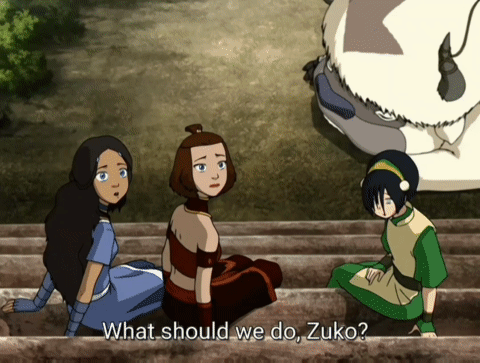
A\ang left them in the worst possible time. Katara already has abandonment issues (see: The Awakening), and the force he was supposed to fight is Zuko's abusive father. But they know they have to keep calm and track him down.
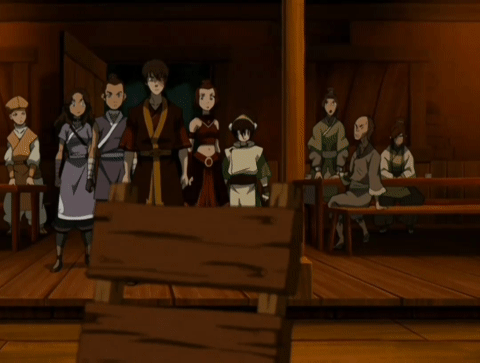
If they were controlled by their emotions together, we would see them get worked up. But we don't. Katara and Zuko once again made a rational decision.
Exhibit C: Sozin's Comet, Part 3: Into the Inferno
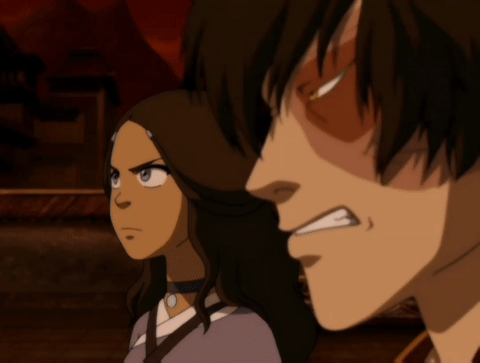
Zuko accepting Azula's offer to an Agni Kai could easily be seen as irrational. He would want to prove he can beat her. But when Katara thinks Zuko is making an emotion-based decision, she calls him out.
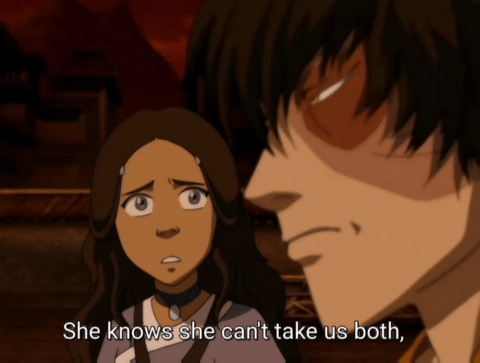
And even insists on it.

And then Zuko reveals that he did think clearly all along, and had a logical reasoning:
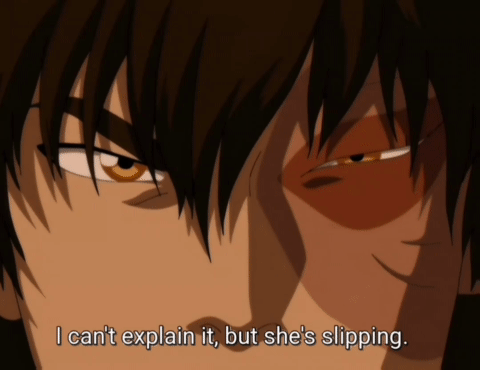
——————
In conclusion, the argument that Zuko and Katara would enable each other has no textual evidence. Time and time again they are proven able to make rational decisions without enabling each other's emotions. Thank you for reading.
#zutara#zutara month#zutara month 2024#anti anti zutara#pro zutara#zutara meta#zuko x katara#katara x zuko#zutara analysis#zutara evidence#zutara forever#zutara nation#zutara should have been canon#zutara supremacy#zutara was robbed#zutarian#zukoxkatara#kataraxzuko
198 notes
·
View notes
Text
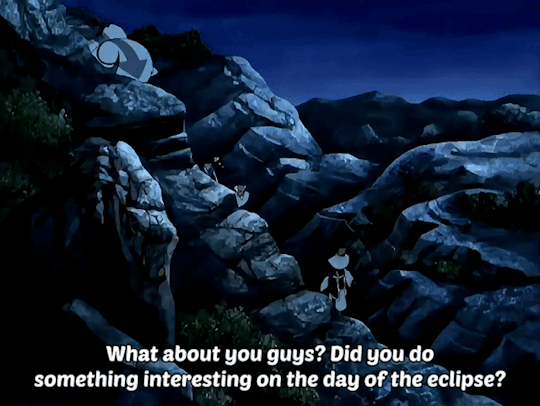
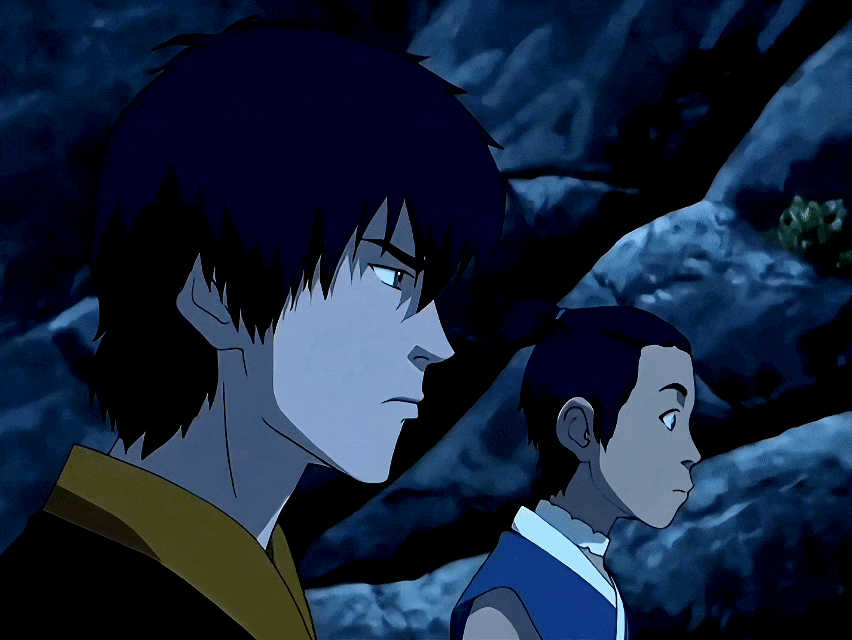



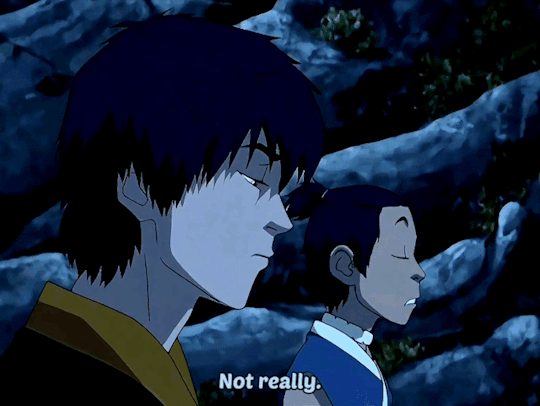
Zuko & Sokka in AVATAR: THE LAST AIRBENDER,
3.10 — The Day of Black Sun, Part 1: The Invasion || 3.11 — The Day of Black Sun, Part 2: The Eclipse || 3.19 — Sozin's Comet, Part 2: The Old Masters
#atla#avatar the last airbender#sokka#zuko#zukka#zuko gif#sokka gif#zukka gif#collecting zukka crumbs
276 notes
·
View notes
Text
So, a Kataang fan made a post about a week ago "asking" (rhetorically, of course) why it's a bad thing Katara acts like Aang's mom. And I just-
First of all, isn't that something that Kataang shippers have been trying to actively dispute for almost two decades at this point? That Katara doesn't treat Aang as a younger brother/son? There's literally an entire post about it from The Headband that's made its rounds on almost every single social media platform.
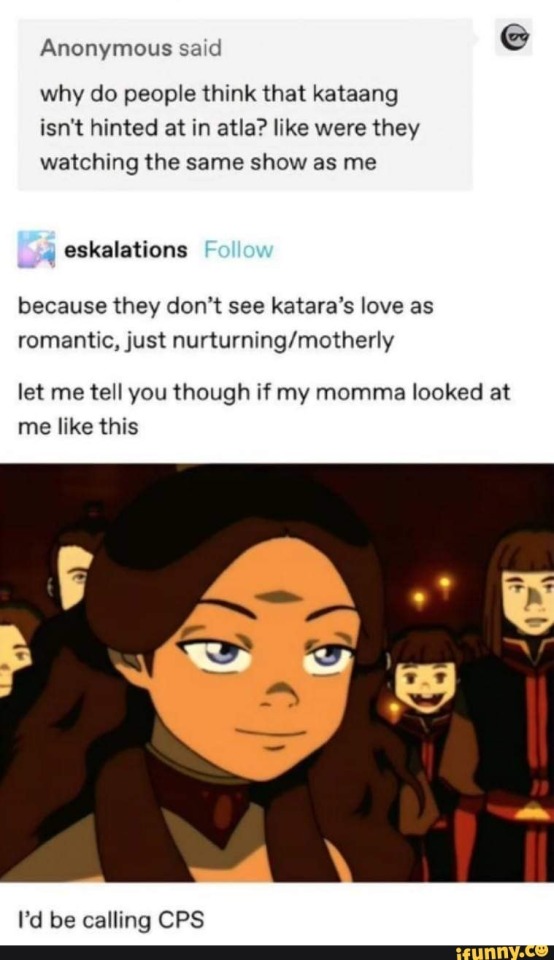
So which is it, besties? Does Katara act motherly towards Aang or not?
(The answer is yes of course, as The Runaway outright confirms it multiple times. The whole premise of that episode is that Katata acts as a mother to Toph, Sokka, and Aang)
Now, why is it a problem? The fact that I have to explain this is telling for how little a lot of Kataang shippers understand Katara.
Katara was parentified. She took care of Sokka (by his own admission) as well as her entire village after Hakoda left. Even before then really, as she says in the very first episode that she's been doing all the chores around the village since their mother died which was years before that. She was delivering literal babies while basically being a baby herself.
Traveling- and being- with Aang is supposed to represent her freedom and childhood, right? That's what the first episode shows us and what Kataang is built on. But if anything, it has the opposite effect.
Book 1 wasn't terrible. Katara was very free-spirited and joyful in addition to being caring and empathetic. Her and Aang could still goof off together, even if she was doing her best to support him emotionally. You could easily see that as her being a good friend.
But somewhere between Books 2 and 3, that changed. Katara went from being his supportive friend to being his emotional crutch. During The Desert, she bears the brunt of him lashing out (he does yell at Toph once, but he's the most volatile with Katara). He also gets frustrated with her during Sozin's Comet, even though Zuko and Sokka were the ones pushing him. It's always Katara who has to bring him back when he loses control of the Avatar State, risking her own safety.
(This isn't emotional, but it was Katara who healed Aang after Azula's attack. She was the one who stayed by his side, staying awake for hours to make sure he would be okay. I like to look at it as a physical representation of their relationship. Aang's wellbeing is always put on her shoulders. If she isn't there to lift him up, he'll fall. And if he falls, the world falls. No 14 year old should be responsible for that. But it's so easy for the show- and y'all- to shove it onto her because this part of her character is never addressed. It's just used as a testament to her caring nature)
Even without Katara's parentification, this causes a major imbalance in their relationship. It puts Katara in charge of managing Aang's pain and being emotionally unsupported in return. The Southern Raiders is proof that Katara can't depend on Aang emotionally the way he does her. She's been his shoulder to cry on through everything and the one time the tables turned, she couldn't even get that from him.
And the saddest thing about this? Katara says to him, "I knew you wouldn't understand." She never expected Aang to support her. She's become so accustomed to being there for others that she's never once expected anyone to do the same for her, least of all Aang.
(But Zuko does. He's the only one who recognized Katara's pain- admittedly, mostly because it was directed at him- and tried to help her. Without being prompted. I gotta give this one to the Zutara folks)
In what world is this dynamic healthy for a romantic relationship?
#anti kataang#anti kataang shippers#i had to process that post for 3-5 business days#i was flabbergasted#aang critical#i really don't hate aang#at least not in books 1 & 2#but pushing kataang ruined his character#i might make an analysis on that later#but this isn't about him#criticizing kataang and criticizing aang are two different things for me#because kataang is awful all around#and aang WAS a good character until bryke ruined him#anti bryke#parentification#pro katara#katara deserved better
243 notes
·
View notes
Text






















A FATHER'S LOVE | a shadow & a creator
Cut by Catherine Lacey / Outer Banks, S2 EP10: "The Coastal Venture" / Die Your Daughter by Susannah Joffe / The Breakfast Club (1985) / Avatar: The Last Airbender, S3 EP18: "Sozin's Comet, Part 1: The Phoenix King" / Daddy by Sylvia Plath / Merlin, S1 EP8: "The Beginning of the End" / Willow, S1 EP6: "Prisoners of Skellin" / Daddy Issues by the Neighborhood / Dead Poets Society (1989) / The Fish Story by Naomi Wallace / Avatar: The Last Airbender, S1 EP12: "The Storm" / DNA by Lia Marie Johnson / Father by the Front Bottoms / As You Are (2016) / Journal, Day Three by Richard Siken / Dead Poets Society (1989) / Merlin, S2 EP8: "The Sins of the Father" / seven by Taylor Swift / The Breakfast Club (1985) / Outer Banks, S1 EP7: "Dead Calm" / Litany in Which Certain Things Are Crossed Out by Richard Siken
#web weaving#fatherhood#merlin#bbc merlin#outer banks#dead poets society#the breakfast club#atla#avatar the last airbender#literature#quotes#word weaving#word web#parallels#moots..... no comment
97 notes
·
View notes
Text
Vote on the first half of the season here!
Propaganda is encouraged!
Voting has closed on this round. Vote on the next poll here!
#atla#avatar the last airbender#aang#sokka#katara#zuko#azula#fire lord ozai#fire lord zuko#princess azula#atla mai#ty lee#polls#poll tournament#atla best episode#the boiling rock#ember island players#sozin's comet#toph beifong
165 notes
·
View notes
Text
Avatar Cycle Trivia
Avatar Wan
Wan's name translates to "ten thousand" in Mandarin Chinese, as he lived ten thousand years before Avatar Korra. His name is also a pun on "one", as in Avatar number one.
Wan wore the colour of each of the four nations during his battle against Vaatu. His robes were yellow and orange (air), his armbands were green (earth), his sash was blue (water), and his scarf was red (fire).
In addition to becoming the first Avatar, Wan is also the first true firebender, as he was the first person to learn firebending from a dragon.
By fusing with Raava during Harmonic Convergence, Wan is technically the oldest Avatar to be identified, being 21 at the time.
The Earth Kingdom battlefield where Wan died is the same field that Zuko visits millennia later in Zuko Alone (Book 2: Episode 7). Interestingly, Wan first appeared in Beginnings, Part 1, which was the seventh episode of Legend of Korra, Book 2: Spirits.
Avatar Yangchen
Yangchen is the only known Avatar to have a sibling (Jetsun).
Yangchen is technically the first Avatar to have an established Team Avatar (not counting Wan and Raava).
Yangchen had split-personality disorder with her past lives, where she essentially suffered from nightmares of her past lives bleeding into her present self.
Yangchen's companion Kavik is the first person ever seen get chi-blocked.
Yangchen did not like the idea of people creating statues of herself in the future. Ironically, she was greatly revered in the Four Nations, and a statue each was built in both the Eastern and Western Air Temples.
Avatar Kuruk
Kuruk is currently the only known Avatar whose predecessor and successor were both women (Yangchen and Kyoshi respectively).
Kuruk had more lovers in 3 decades than Kyoshi did in over 2 centuries (the true story is more tragic).
Kuruk had a habit of challenging random people to feats of strength, which makes him the only known Avatar in history to have participated in an Agni Kai.
Kuruk was the best hunter and tracker in the history of the Four Nations. It's said there was nothing he couldn't hunt or track down (that includes spirits).
Kuruk is the only known Avatar to enter the Spirit World after death. Considering that only people with a special connection to the Spirit World can enter at death (such as Iroh and Yue), this means Kuruk must have had a spiritual connection rivalling that of most Air Nomad monks or nuns.
Avatar Kyoshi
Kyoshi is the only known Avatar known to be of mixed nationality; her father was from the Earth Kingdom, while her mother was a renegade Air Nomad.
Kyoshi had a rare condition with her earthbending where she could move large objects with ease but had difficulty in moving smaller objects (Suffering From Success).
Kyoshi has witnessed more passings of Sozin's Comet than anyone else, with three (not counting Lao Ge).
Kyoshi learned the secret to immortality from Lao Ge, which led her to have the longest lifespan of any Avatar.
Kyoshi has threatened both the Earth King and the Firelord.
Avatar Roku
Roku and Firelord Sozin share the same birthday.
Roku has been featured in the introduction sequences of both Avatar: The Last Airbender and The Legend of Korra.
Roku is the only known Avatar to appear old when he was called upon by the current Avatar.
When Roku entered the Avatar State for the first time, he destroyed the Fire Sage Temple.
Roku's dragon Fang is the only animal companion ever seen in the Spirit World.
Avatar Aang
It took Aang longer than any Avatar in history to become fully realized, being over a century old.
Aang has a scar on his back and on his foot, because of how electricity works.
Aang choosing four toys out of thousands – to identify him as the Avatar as these four toys were the same ones that past Avatars had chosen for generations when they were children – was the same procedure used by the Tibetan Buddhist monks to recognize the next reincarnation of the Tulku Lama.
Aang has met the original source of every bending art: a flying bison for air, the Moon Spirit for water, badgermoles for earth, and two dragons for fire.
Aang is the first Avatar to have his picture taken.
Avatar Korra
At four years old, Korra is the youngest Avatar in history to be identified.
Korra is the first Avatar to learn spiritbending.
Korra is the only Avatar to break out of bloodbending without the use of the Avatar State (sorry, Aang).
Korra is the only Avatar to have killed a member of her own family (Unalaq).
Korra is the first known person to ever tame a polar bear-dog (Naga).
Miscellaneous
Wan and Roku are the only two Avatars to die in combat.
Roku and Aang are the only two Avatars to fight a volcano. Aang was successful, while Roku died.
Aang and Korra are the only two Avatars to ever be defeated in the Avatar State.
Aang and Kyoshi are the only two Avatars to ever get hit by lightning. Ironically, when Kyoshi was hit by lightning, her chakras were opened and she gained the ability to enter the Avatar State; conversely, Aang's chakras were blocked and he was unable to enter the Avatar State.
Kuruk and Roku are the only two Avatars to have been identified the "traditional" way in their respective nations at 16; Wan fused with Raava at 21, Kyoshi was identified at 16 when she recited Kuruk's poem, and Yangchen, Aang and Korra were identified at younger ages.
Yangchen, Aang, and Korra are the only Avatars to have been identified at younger ages than 16.
Wan, Aang, and Korra are the only Avatars who are modeled after real-life people. Wan is modeled after co-creator Bryan Konietzko (but with cooler hair); young Aang is modeled after Arjuna, Sifu Kisu's son (but Aang is bald), while adult Aang is modeled after co-creator Mike DiMartino; and Korra is modeled after various female MMA fighters, most notably Gina Carrano.
Roku and Korra are the only two Avatars who have worn an outfit from each of the four nations on-screen.
Roku and Korra are the only two Avatars to have connections to royalty. Firelord Zuko, and thus every following Firelord, are descendants of both Roku and Sozin, whereas Korra's father was a member of the Northern Water Tribe's royal family, and was later elected as the chief of the newly independent Southern Water Tribe.
When Kyoshi first met Yangchen, she (Kyoshi) mistook Yangchen for her own mother.
When Kyoshi first met Kuruk, she almost drowned her physical body trying to communicate with him.
Roku and Yangchen are the only two Avatars to have hugged the current Avatar at the time (Aang and Kyoshi respectively).
Wan, Korra, and Kuruk are the only Avatars to refer to Raava by name, although the latter (Kuruk) had never met Raava.
Yangchen, Kuruk, and Aang are the only Avatars to have invented an airbending technique. By extension, Kuruk is the only person outside of the Air Nomads to invent an airbending technique (he didn't get his mastery tattoos, what a shame).
Aang and Korra are the only two Avatars to learn energybending.
Kyoshi, Roku, and Aang are the only Avatars to use bending after their respective deaths.
Kyoshi, Roku, and Aang are also the only Avatars to have descendants (but let's be realistic, so did Kuruk).
Aang and Korra both learned their native element from a companion of the previous Avatar, and their final element from a descendant of the previous Avatar. Aang learned airbending from Monk Gyatso, a companion of Roku, and learned firebending from Zuko, Roku's great-grandson. Korra learned waterbending from Katara, Aang's wife, and learned airbending from Tenzin, Aang and Katara's youngest son.
That's all the fun facts I could find.
284 notes
·
View notes
Photo




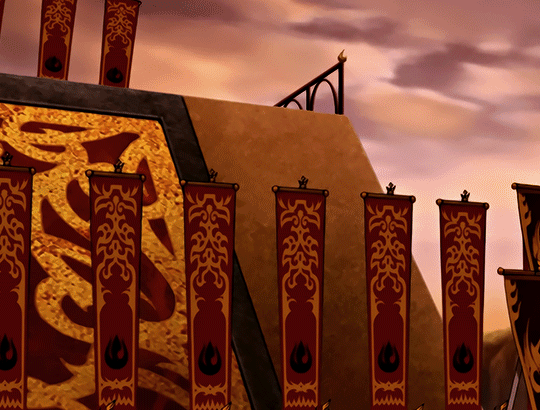


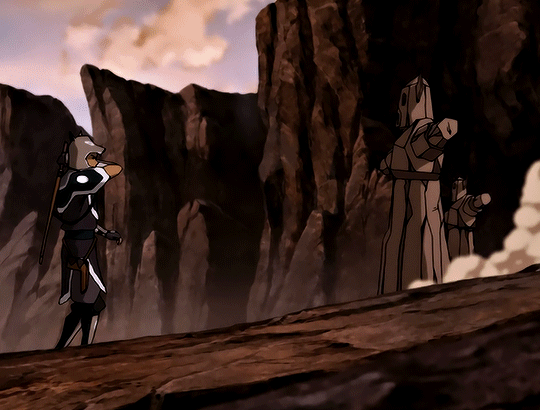
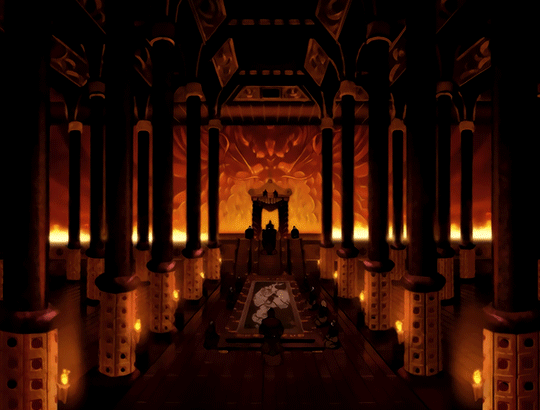

AVATAR: THE LAST AIRBENDER 3x18 ➢ Sozin's Comet, Part 1 - The Phoenix King
#atlaedit#avataredit#animationedit#cartoonedit#tvedit#animationsdaily#entgifs#useroptional#airbendersource#cinemapix#userbbelcher#toph#aang#avatar the last airbender#atla#atla episodes#mygifs#*
579 notes
·
View notes
Text
ana's meta masterlist
Pro-Zutara:
the official zutara dissertation: part 1 | part 2
zuko, aang and taking lightning for katara
zutara and romantic coding
"you rise with the moon, i rise with the sun" is a zutara line
zutara and thematic significance
zutara vs jetara
zutara parallels in the awakening
zutara's narrative culmination
zutara in the crossroads of destiny:
azula vs katara
love as resistance in the catacombs
zutara in the southern raiders:
the true source of katara's anger at zuko
katara bloodbending before zuko
the narrative relevance of zutara
zutara and bloodbending
zutara's narrative symmetry
why zuko had to betray katara in ba sing se
Anti Anti-Zutara:
the official zutara dissertation (p.3)
"zutara would face too much opposition from their countries"
"zuko and katara are a colonizer/colonized ship"
"zuko and katara would fight all the time”
"platonic zutara is better than romantic zutara"
"fire lady katara is racist"
“zuko would’ve taken lightning for anyone”
“katara is too traumatized by the fire nation”
“shipping zutara is amatonormative”
ATLA Ship Criticism:
the official zutara dissertation: part 4 | part 5 | part 6
why mai.ko was never intended to be canon
mailee is a better ship than mai.ko
how kat.aang could've been fixed
kat.aang's lack of trust in the southern raiders
emotional labour in kat.aang
kat.aang’s narrative imbalance
comparing katara and aang's parenting
the fortuneteller does not foreshadow kat.aang
ATLA/LOK:
azula/katara parallels
katara's choice in the crossroads of destiny
was zuko's betrayal in-character?
zuko's comments in the southern raiders
zuko's comments in the southern raiders (pt. 2)
zuko is not a “bad boy”
zuko’s treatment of aang in sozin’s comet
sokka didn't feel inferior to katara
did mai fear azula?
comparing mai and toph
azula vs zuko: the tragedy of narrative foils
should aang have killed ozai?
sexism in the water tribes
thoughts on the atla comics
writing a final battle: kung fu panda vs atla
gratuitous violence in the legend of korra
The Hunger Games:
zutara and everlark parallels
zutara and everlark parallels (pt. 2)
gale's arc in the hunger games trilogy
the myth of humanity's inherent evil
the ending of lucy gray
Squid Game:
individualism under capitalism
the ethics of billionaires
#zutara#anti kataang#anti maiko#zutara meta#been intending to do this forever but i'm on this hellsite so much that going through my archives took an eternity lmao#anyway here's a collection of patented ana rambles
631 notes
·
View notes
Text
Every Single Time Azula Insults or Criticizes Zuko
"The Avatar State":
Zuko:[Angrily.] What are you doing here?
Azula: [Holds up a shell in her hand.] In my country, we exchange a pleasant hello before asking questions. [Rises and walks toward Zuko and Iroh.] Have you become uncivilized so soon, Zuzu?
2.
Azula: You know, Father blames Uncle for the loss of the North Pole. And he considers you a miserable failure for not finding the Avatar! [Cuts to Zuko, who is panting heavily.] Why would he want you back home, except to lock you up [Cuts back to Azula.] where you can no longer embarrass him?
"Zuko Alone":
1.
Young Azula: You waste all your time playing with knives. You're not even good!
2.
Young Azula: [Sits back down, and looks at Zuko out of the corner of her eye and whispers.] You'll never catch up …
"The Chase":
Azula: [Coolly.] You mean you haven't guessed? You don't see the family resemblance? Here's a hint. [Covers her eye and deepens her voice, imitating Zuko.] I must find the Avatar to restore my honor! [Aang remains silent; back in her normal voice.] It's okay, you can laugh. It's funny.
"The Crossroads of Destiny":
Azula: You're so dramatic. What? Are you going to challenge me to an Agni Kai?
"The Beach"
Zuko:[Cut to closer view of Zuko and Mai. Angrily.] Doing nothing is a waste of time. [Rises from his seat next to Mai.] We're being sent away on a forced vacation. [Walks over and grips the railing of the boat.] I feel like a child. Azula:[Frontal view.] Lighten up. So Dad wants to meet with his advisors alone, without anyone else around. Don't take it personally.
2.
Zuko:[Frontal view from behind the girls. Losing it now; furiously.] I'm angry at myself!Slamming down with his clenched fists he causes the camp fire to turn into a pillar of fire, the girls recoil from the flames. Cut to close-up view from above of Zuko. Cut to a wide-view of the entire campsite as the flame dies down. Zuko turns away. Azula: Why? Zuko[Close-up.] Because I'm confused. Because I'm not sure I know the difference between right and wrong anymore. Azula: You're pathetic.
"The Avatar and the Firelord"
1.
Azula: It's never too early for a sitting with the court painter, Zuko. Make sure he gets your good side.
2.
Zuko: But how did he die? Azula: [Turning toward Zuko.] Didn't you pay any attention in school, Zuko? He died peacefully, in his sleep. [Cut to a shot of the full room, as Azula walks away.] He was ancient.
"Nightmares and Daydreams"
Azula: Hello, Zuzu. If you've come for a royal hair-combing, I'm afraid you'll have to wait. Zuko: So I guess there's a big war meeting coming up, huh? And apparently I'm not welcome there. Azula: What do you mean? Of course you're welcome there! Zuko: Oh, yeah?! I guess that's why no one bothered to tell me about it! Azula: Oh, Zuko. Don't be so dramatic. I'm certain Dad wants you there. You probably just weren't invited because it's so obvious you're supposed to be there. Zuko: Well, were you invited? Azula: Of course! I'm the princess. Zuko: And I'm the prince! Azula: Exactly, so stop acting like a paranoid child! Just go to the meeting.
"Sozin's Comet Part III":
Zuko: Sorry, but you're not gonna become Fire Lord today. [Jumps off Appa.] I am. Azula: [Laughs.] You're hilarious.
The most consistent things she criticizes him for are being too "dramatic" and immature.
64 notes
·
View notes
Text
Zutara Ship Baiting Moments
Before I start listing off the scenes I need to explain this: The scenes are coded as romantic, they're not explicitly romantic. I'm not saying Zuko and Katara were canonically in love with each other, I'm saying some scenes ended up tropy with romantic undertones.
THE WATERBENDING SCROLL:

"I'll save you from the pirates".
Yeah he's threatening her, but what is this line? Why did he grab her hands while saying that? Why did he get so close to her, even after she was tied? Why wrapping his hand around her? All of this is extra work to the animators. He could have just dangled it in front of her, but instead we got a typical enemies to lovers moment.
THE SIEGE OF THE NORTH PART 1:

(1th) "Well, aren't you a big girl now".
(2th) "You rise with the moon, I rise with the sun".
Once again he says these lines, that are completely unnecessary, shippy, enemies to lovers. Why? What is it doing here?
THE CROSSROADS OF DESTINY:
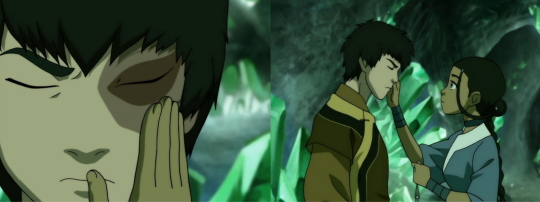
The soft yet exciting music, the shinning crystals, Katara's hand on Zuko's thumb, all speak for themselves. Katara absolutly didn't have to touch Zuko's face like this, they get interrupted. And when she heals she puts the water on the spot, so I'd make sense if they got interrupted. But they didn't, and she didn't even took out the water. Then it won't be shippy.
THE SOUTHERN RAIDERS:

This is a perfect example of the "Suggestive Collision" trope. An actual romance trope. And then, of course, the "Please Get Off Me" trope. They're used to create romantic tension. Whyyyyyy?
EMBER ISLAND PLAYERS:
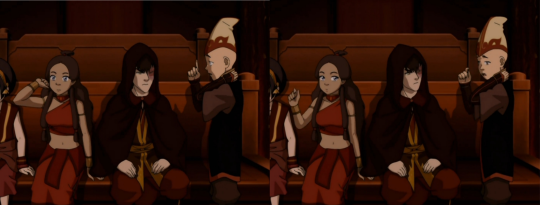
Aang is about to sit next to Katara, and then Zuko steals his seat. Katara notices, tucks her hair behind her hair and gives Zuko a glance. Why do that? Why do something that really looks like it's foreshadowing a love triangle? Why do that when it goes by so fast and does nothing? Why animating this? Why writing this?
SOZIN'S COMET PART 2:

"She's not my girlfriend"!
Another typical romance trope, the "She Is Not My Girlfriend". Used for romantic leads/ eventual romantic leads.
SOZIN'S COMET PART 4:
What else can I say about this scene? It's very obviously ship baiting. But if you don't think it is, here's a video taken from here with Sokka inserted there. What a beautiful comclusion to a beautiful relationship.
#zutara fandom#zutara#zutarian#pro zutara#zukoxkatara#zuko x katara#kataraxzuko#katara x zuko#anti anti zutara#zutara meta#zutara analysis#zutara evidence#zutara forever#zutara quotes#zutata was robbed#atla critical#anti bryke#bryke critical#anti kataang#kataang critical#the southern raiders original#the crossroads of destiny#crossroads of destiny#zutara was robbed
664 notes
·
View notes